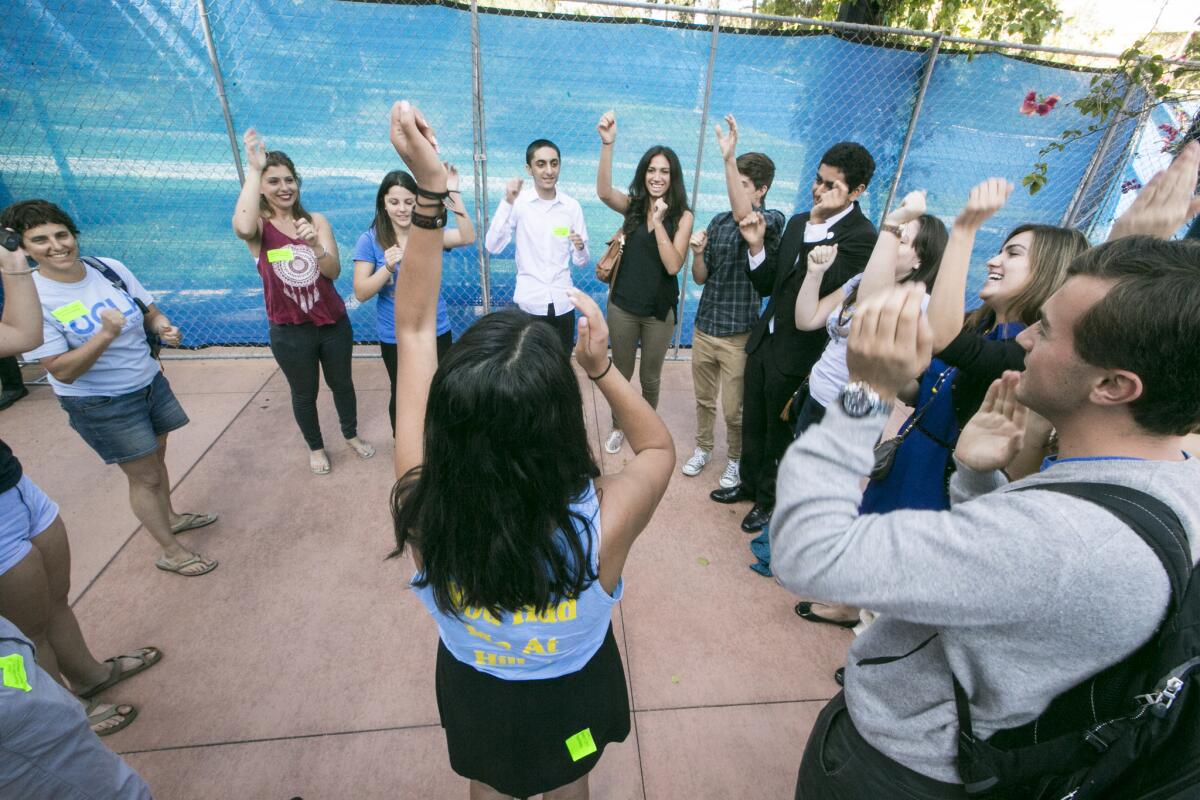Editorial: UC’s intolerance policy goes dangerously astray on anti-Semitism

Members of UCLA Students Against Anti-Semitism gather following a UC Board of Regents meeting at UC Irvine on Sept. 17, 2015.
- Share via
For almost a year, the University of California has been struggling to address complaints that campus protests against Israel have crossed the line into harassment of Jewish students, but to respond in a way that wouldn’t undermine the university’s commitment to free speech. The latest effort, a report by a UC regents working group, says a lot of the right things and includes a proposed set of Principles Against Intolerance that, while imperfect, represents an earnest effort to balance condemnation of hateful conduct with support for robust debate.
In one crucial respect the report goes dangerously astray: It conflates anti-Semitism with anti-Zionism.
But in one crucial respect the report goes dangerously astray: It conflates anti-Semitism with anti-Zionism and says both are forms of discrimination that “have no place at the University of California.” It’s difficult to read that as anything other than a warning to those students or faculty members who have fundamental disagreements with the state of Israel. It apparently rules out of bounds an assertion by, say, a Palestinian professor that Israel’s creation was unfair and unjustifiable, or by a Jewish student that Israel should be replaced by a nonsectarian state. Both are ideas that this page opposes but they are fully entitled to protection at a public university under the 1st Amendment.
The equation of anti-Zionism with anti-Semitism might also make it easier to stigmatize protests against Israeli policies — particularly the treatment of Palestinians — even if they don’t actually oppose the idea of a Jewish state. Pro-Palestinian activists on campus are right to fear that such a statement would target their advocacy even when it doesn’t involve anti-Semitic language or harassing behavior.
The UC regents will consider the working group’s report at their March 23 meeting. The regents could approve the entire document, including the language that equates anti-Zionism and anti-Semitism, or they could decide to endorse only the Principles of Intolerance, which are more restrained in their language and refer simply to “anti-Semitism and other forms of discrimination.” Or the regents could go back to the drawing board.
We aren’t convinced that any new statement is necessary, given a plenitude of policies and disciplinary procedures already on the books. They include a Policy on Ethical Values and Standards of Ethical Conduct stating that UC “prohibits discrimination and harassment and provides equal opportunities for all community members and applicants regardless of race, color, national origin, religion, sex, gender identity, pregnancy, physical or mental disability, medical condition (cancer-related or genetic characteristics), ancestry, marital status, age, sexual orientation, citizenship, or status as a covered veteran.”
But if the regents insist on adopting some further statement, it should be pruned of any suggestion that criticism of Israel — or Zionism — is anti-Semitism.
To be fair, neither the working group document nor an earlier statement presented to the regents last September adopted the principal demand of the activists who have driven this issue: that UC endorse the so-called State Department definition on anti-Semitism, a 2010 document that defined anti-Semitism to include “demonizing” the State of Israel, subjecting it to “double standards” or denying its right to exist.
But the report’s linkage of “anti-Semitism” and “anti-Zionism” blurs an important distinction. It is no doubt true that there are anti-Zionists who are also anti-Semites. But it is certainly possible to oppose Israel and not harbor or express prejudice against Jews. Some critics of Zionism are themselves Jewish. No doubt many Jewish students at UC strongly identify with Israel and are deeply offended by criticism of its policies or attacks on its legitimacy. But that doesn’t justify equating those opinions with bigotry or stifling their expression.
Some at UC point to incidents in which they say Jewish students have been the victim of acts of harassment by tormentors who made no distinction between Judaism and Zionism. The working group cites similar complaints that “opposition to Zionism is often expressed in ways that are not simply statements of disagreement over politics or policy but also assertions of prejudice and intolerance toward Jewish people and culture.” When that happens, the university should act swiftly and strongly to protect victims of anti-Semitic harassment, intimidation and physical threats. UC seems to have adequate existing procedures to address such conduct.
The working group’s document makes many important points: that free speech principles should be paramount at a public university, that students should expect to be challenged intellectually and emotionally on campus, and that they may have to hear notions that are “abhorrent” to them or “shocking.”
All absolutely true. And all in utter conflict with the conflation of anti-Semitism with anti-Zionism.
Follow the Opinion section on Twitter @latimesopinion and Facebook.
MORE EDITORIALS
More to Read
A cure for the common opinion
Get thought-provoking perspectives with our weekly newsletter.
You may occasionally receive promotional content from the Los Angeles Times.










